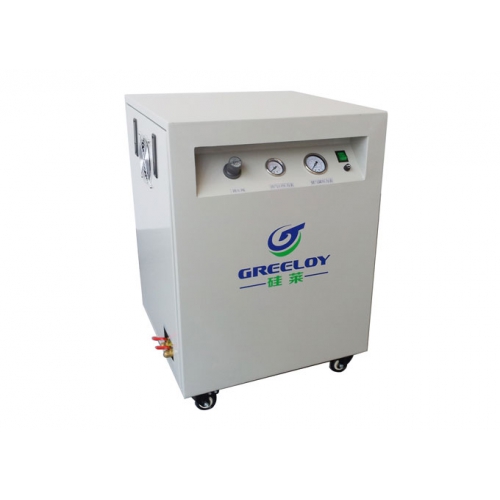Nowadays, a whole range of oilless air compressors is available on the market. Oil-free compressors have the big advantage that they are 100% oil-free, so there is zero chance of oil in the compressed air system. Why first contaminate the air, to clean it up again later with filters, when you can create clean compressed air with an oil-free compressor?
There is however one downside to oil-free compressors: corrosion. The oil in oil-lubricated compressors will create a protective film of oil inside the air receiver and air piping. But still, an oil-free compressor would be highly favorable over an oil-lubricated one. There are galvanized or stainless steel air receivers available nowadays, as well as plastic compressed air piping, which will eliminate the problem of corrosion.
Studies have shown that the air that your dentist uses to blow dry your teeth isn’t always very healthy for you. You might not have thought about it, but somewhere in your dentist clinic is a compressor that supplies the compressed air for all his ‘work stations’. It’s not different from an ordinary workshop, only this time the compressor needs some extra special attention.
So what makes a dental compressor so special? The air that is produced by the compressor is used directly in human mouths. They will inhale the air and swallow any contaminations that is within the compressed air. Of course, the compressor and the compressed air must meet the highest possible standards!
Oil in air
Not a nice thought: oil in your mouth. If the compressed air coming from the dental air compressor would contain oil, not only would this give a bad taste in your mouth, it would be a high safety concern. Also, oil in the air will facilitate dirt and bacteria build up in the compressed air system.
In the old days, dentist had no other choice than to buy a oil-lubricated compressor and use filters in the compressed air line to filter out any oil in liquid or vapor form. But, with filters you can never be 100% sure. Filters will get old and require replacement in time, before they deteriorate.
When buying a compressor, also make sure that the output (the amount of air it can produce per minute or hour) is right for you. A too-small compressor will give you problem for the obvious reason that the pressure will drop when too many people use air at once.
But a too big compressor can also cause problems. If the compressor is so big that it only runs for 5 minutes a day, every other day, than problems with corrosion can occur, as the compressor never gets the chance to run for some time and get hot. It’s like when you lie in your bed all day for a year… you’ll get slow, lazy, tired.
